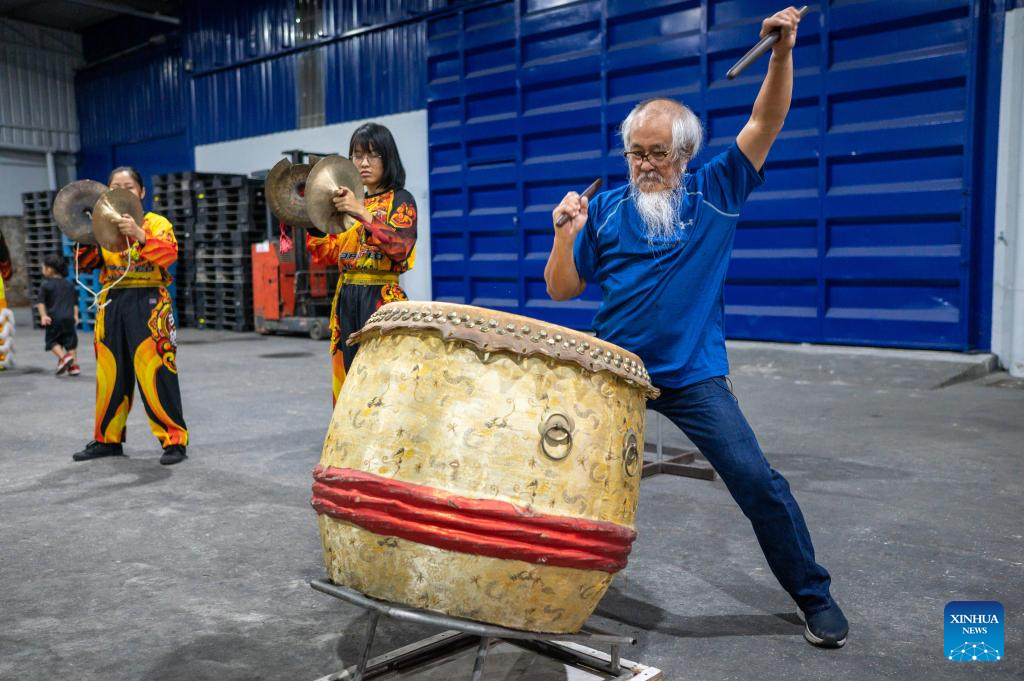Return of tiger dance revitalizes Chinese cultural heritage in Malaysia
 0 Comment(s)
0 Comment(s) Print
Print E-mail Xinhua, January 29, 2022
E-mail Xinhua, January 29, 2022

The night has fallen as the last sun rays shrank into the dark. Situated in an industrial park located at the outskirts of Subang near Malaysian capital Kuala Lumpur, the lights are still on in a warehouse, and the persistently reverberating drums and cymbals can be heard outside of the fence.
A yellow furry body with tiger stripes leaps up onto the stilts effortlessly, as if it is gravity-defying while dancing to the rhythms of beating drums. It is not the usual Chinese Lion in an array of colors that the society is familiar with. Instead, it is the dancing "king" -- a tiger who has returned to people's vision after years.
The tiger, looking fierce with its pair of bushy eyebrows that are a little similar to angry birds, is instead endearing with its pair of blinking eyes and smiley-looking while it shows its cute white fangs.
Siow Ho Phiew, 67, who remains passionate about the art of Chinese Lion Dance for more than half of his life, is training his apprentice while more practice is ramping up as the Chinese New Year approaches closer.
Master Siow, as he is often called for his expertise, has been actively promoting traditional lion dance performances in Malaysia. Under his guidance, the Muar town Kun Seng Keng lion dance troupe from Johor has earned the reputation of being "kings of lions" with dozens of wins in the Lion Dance championships both home and abroad.
In a recent interview with Xinhua, Master Siow said that Chinese lion and dragon dances have become a fixture during Lunar New Year celebrations in Malaysia.
Siow told Xinhua the idea of tiger dance could be traced back to 2010, as he was hoping to inject some new elements into the inheritance of Chinese culture in Malaysia.
"No one has ever seen dragons, but the lion and dragon dances created by the Chinese are deeply rooted in the hearts of the people and are very popular. So tiger dance shall work too," said Master Siow.
However, it was never an easy journey for Master Siow, arguably the creator of tiger dance in Malaysia to choreograph the dance.
Siow said that the design, rhythm and moves for tiger dance are different from lion dance even if there are some resemblances. He created dance moves that highlighted the characteristics of a mighty and nimble tiger based on the actions of the real tiger. He also adjusted the drumming for tiger dance to be relatively mild with just a hint of roaring cymbals.
"Malaysia is a country with beautiful tropical rainforest. There are tigers in our national emblem as well. I believe this land is definitely suitable for the creation of tiger dance," Siow said.
Master Siow emphasized that he wished his apprentice would inherit more than just techniques in lion dance, but also to inherit the Chinese culture and the spirit in it. He summarised his philosophy into eight virtues, consisting of loyalty, integrity, perseverance, courage, wisdom, sincerity, harmony and etiquette.
In the midst of the COVID-19 pandemic, the tiger dance crafted by Master Siow 12 years ago has been given new meanings rather than just an auspicious greeting festive performance.
"We hope to spread more positive vibes through our whimsical tiger dance, and put a smile on everyone's face. Stay safe, and have a happy and peaceful year ahead," Siow said.






Go to Forum >>0 Comment(s)